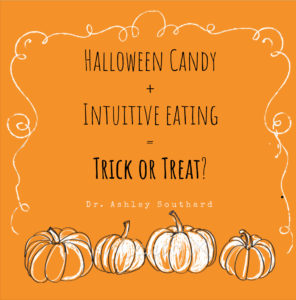Halloween Candy + Intuitive Eating = Trick or Treat?
by
 With Halloween upon us, your home may soon be inundated with heaping mounds of candy. As kids feel excitement about the sudden influx of sugar, parents may find themselves scheming up tricks to make the treats disappear before their children become mini sugar addicts.
With Halloween upon us, your home may soon be inundated with heaping mounds of candy. As kids feel excitement about the sudden influx of sugar, parents may find themselves scheming up tricks to make the treats disappear before their children become mini sugar addicts.
But before we engage in candy buyback programs or mysterious overnight disappearances, I’d like us to consider an alternative approach that is grounded in the principles of Intuitive Eating (also known as ‘mindful eating’). After all, don’t we as parents hope that our children will grow up to be intuitive eaters who feel in control of their food, rather than food in control of them?
Our children are never too young to begin learning the principles of intuitive eating, and Halloween is a perfect opportunity for this. So, rather than parents taking charge of candy rationing and leaving children to feel like they must be restrained from this highly coveted and seemingly dangerous food (which sounds eerily similar to a diet), why not try the following strategies to promote a calm, moderate approach to candy during this festive time of year:
- Ask your child to sift through the candy pile and divide the candy into three groups: (1) absolute favorites / definitely want to eat; (2) like, but definitely not first choice; and (3) could live without / don’t like. This helps children become aware of what they like and don’t like in their loot.
- Explain to your child that they can eat any of the candy, but that they may want to start with their favorites. Mindful eating is all about saving the BEST for FIRST! If you save the best for last, then you may end up eating a lot of food you don’t really like just to get to the good stuff.
- Talk with your child about how candy affects the body (in age-appropriate terms). Teach children that sugar is OK (because all foods are OK in moderation), but a lot of sugar can make their tummy hurt (as is true with too much of any food).Avoid using words like ‘bad’ or ‘unhealthy’ to describe sugar; be objective in your descriptions. Teach them that it’s best to balance sugar with other types of foods (e.g., apples, chicken, milk, etc.) so that their body feels good.
-
 When your child eats the candy, request that they eat it at the table without distraction so that they can focus on enjoying the candy. We tend to feel more satisfied with our meals and snacks when we attend to the experience with awareness and focus.
When your child eats the candy, request that they eat it at the table without distraction so that they can focus on enjoying the candy. We tend to feel more satisfied with our meals and snacks when we attend to the experience with awareness and focus. - Let your child know that they can have more candy in the near future (e.g., later today, tomorrow, etc.). If they think this is their last chance to eat it, they will likely overdo it and crave it more in the future.
- Allow your child to experience the natural consequences of eating too much candy. If they experience a stomach ache or sugar crash, explain to them that this is naturally what happens when the body gets more sugar than it wants. Many times, we have to experience something firsthand before we accept the notion that we should do something differently.
- Finally, be a role model for a healthy relationship with sugar. Children learn primarily by watching what their parents do, so take this opportunity to show your child how to be a mindful candy eater. Enjoy your favorite candy at the table, talk about when your body feels satisfied after eating a few pieces, and avoid making any judgmental comments about your body and/or your child’s body (or anybody’s body, really).
 When children are encouraged to trust their bodies and make food choices that taste good and feel good, they become Intuitive Eaters who feel at peace with food. And when candy is no longer the primary focus of the day, costume contests and spooky jack-o-lanterns can take back the night. Happy Haunting!
When children are encouraged to trust their bodies and make food choices that taste good and feel good, they become Intuitive Eaters who feel at peace with food. And when candy is no longer the primary focus of the day, costume contests and spooky jack-o-lanterns can take back the night. Happy Haunting!
Dr. Ashley Southard is Site Director and Clinical Therapist at A New Beginning and the Co-Founder and Program Director of TheHealthyWeighOut, both in Scottsdale, Arizona. She has been helping people achieve full recovery from eating disorders since 2002!






